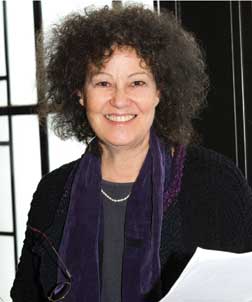Nancy Condee Wins MLA’s Scaglione Prize for Studies in Slavic Languages and Literatures
 Nancy Condee
Nancy CondeeNancy Condee, Pitt professor and director of Graduate Studies in the Department of Slavic Languages and Literatures in the Kenneth P. Dietrich School of Arts and Sciences and director of Pitt’s Global Studies Center, received the Modern Language Association’s (MLA) ninth Aldo and Jeanne Scaglione Prize for Studies in Slavic Languages and Literatures for her book The Imperial Trace: Recent Russian Cinema (Oxford University Press, 2009). The prize—awarded biennially for an outstanding scholarly work on the linguistics or literatures of the Slavic languages—was presented Jan. 7 at the MLA’s annual convention in Seattle.
MLA’s citation for The Imperial Traces reads: “Condee brilliantly accomplishes two pressing goals at once. The book is an insightful guide to six major post-Soviet filmmakers whose work it explores aesthetically as a function of cinematic style and cultural ideology and historically as an imaginative response to the decay and collapse of the Soviet Union and to the turbulent post-Soviet aftermath. If the debate on Russia’s imperial and national identities has been dominated by historians and social scientists, then The Imperial Trace insists on the pertinence of cultural production even as it engages in a dialogue across disciplines. Condee succeeds in her goal, not by dissolving each filmmaker into his or her context, but by exploring the more oblique tricks of the imaginative trade by which a work of art ponders, disavows, or transfigures its own time.”
The Imperial Trace also won the 2010 Katherine Singer Kovács Book Award from the Society for Cinema and Media Studies. Condee’s most recent work is the coedited volume The Cinema of Alexander Sokurov, with Birgit Beumers (I.B. Tauris, 2011).
Director of Pitt’s graduate program for cultural studies from 1995 to 2006, Condee is a specialist in contemporary Russian culture and cultural politics, Soviet cultural politics, late-Soviet and post-Soviet cinema, imperial and postcolonial theory, and Soviet and post-Soviet popular culture. She also is a Pitt Film Studies Program faculty member.
The MLA, the largest and one of the oldest American learned societies in the humanities, promotes the advancement of literary and linguistic studies. The more than 30,000 members of the association come from all 50 states and the District of Columbia, as well as from Canada, Latin America, Europe, Asia, and Africa.
Other Stories From This Issue
On the Freedom Road

Follow a group of Pitt students on the Returning to the Roots of Civil Rights bus tour, a nine-day, 2,300-mile journey crisscrossing five states.
Day 1: The Awakening
Day 2: Deep Impressions
Day 3: Music, Montgomery, and More
Day 4: Looking Back, Looking Forward
Day 5: Learning to Remember
Day 6: The Mountaintop
Day 7: Slavery and Beyond
Day 8: Lessons to Bring Home
Day 9: Final Lessons

